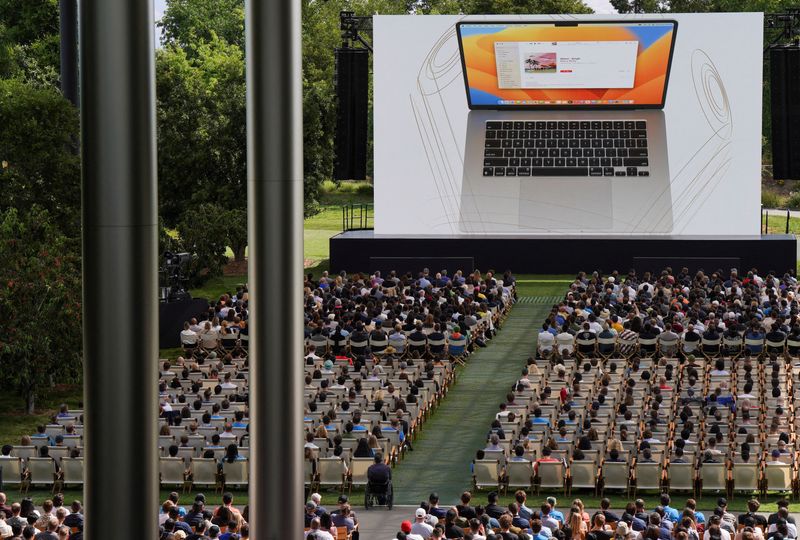By Shivangi Acharya
NEW DELHI (Reuters) - India is expected to limit imports of laptops, tablets and personal computers after January, two government sources with direct knowledge of the matter said, a move to push companies such as Apple (NASDAQ:AAPL) to increase domestic manufacturing.
This plan, if implemented, could disrupt an industry worth $8 billion to $10 billion and reshape the dynamics of the IT hardware market in India, which is heavily reliant on imports.
A similar plan to restrict imports was withdrawn last year following backlash from companies and lobbying from the United States. India has since monitored imports under a system set to expire this year and has asked firms to seek fresh approvals for imports next year.
The government feels it has given the industry enough time to adapt, said the sources, who did not want to be identified as discussions are private.
One of the sources said New Delhi will begin consultations with all sides starting next week. It could delay implementing the import restrictions by a few months if needed, the source added.
India's Ministry of Electronics and Information Technology (MeitY) is working on a new import authorisation system, where companies will have to get prior approvals for their imports, one of the two sources said.
Under the current regime, laptop importers are free to bring in as many devices after an automated online registration.
The industry is dominated by the likes of HP (NYSE:HPQ), Dell (NYSE:DELL), Apple, Lenovo and Samsung (KS:005930), with two-thirds of Indian demand being currently met through imports, a significant amount from China. India's IT hardware market, including laptops, is estimated at nearly $20 billion, of which $5 billion is domestic production, according to consultancy Mordor Intelligence.
The government is considering minimum quality standards under its 'compulsory registration order' for laptops, notebooks and tablets, as one of the ways to weed out low quality devices, the officials said.
"We are working on such restrictions as global treaties stop us from any tariff action on laptops and tablets. It leaves us with few policy options to limit imports," the second official said.
The federal electronics ministry did not respond to request for comment. The trade ministry said an appropriate decision on the import management system would be taken after consultation with the electronics ministry and other stakeholders.
Such a move will benefit contract manufacturers such as Dixon Technologies who have entered separate pacts with global firms like HP to make laptops and computers in India. Dixon aims to cater to 15% of India's total demand.
LOCAL PRODUCTION
Limits to India's imports should be calibrated based on India's domestic production capacity, an industry source who is part of the government's consultations said.
The nation's key production incentive scheme for IT hardware has drawn participation from global firms including Acer, Dell, HP and Lenovo. Most of the approved participants are ready to start manufacturing, India's electronic minister said last year.
India has federal subsidies worth nearly $2.01 billion to promote domestic production.
Data from research firm Counterpoint shows imports of laptops completely assembled abroad in the first five months of 2024 fell 4% from a year earlier, with firms such as Lenovo and Acer increasing local assembly for entry-level laptops.
India has been long emphasised the need for "trusted sources" for electronics and communication devices amid growing concerns over cyberattacks and data theft.
In 2022, Indian Prime Minister Narendra Modi said India should cut reliance on foreign countries for communication technology such as servers.

India will implement mandatory testing of "essential security parameters" for all CCTV cameras from April 2025.
($1 = 84.0390 Indian rupees)
(Additional Reporting by Munsif Vengattil in Bangalore; Editing by Jacqueline Wong)